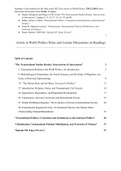Summary of the material for the final exam (2021) for Actors in World Politics. INCLUDES notes
and lecture discussions from (Total: 54 pages):
● Sanjeev Khagram and Peggy Levitt’s book “The Transnational Studies Reader: Intersections
& Innovations”, chapters 2, 9, 19, 27, 39, 45, 47 and 48.
● Sidney Tarrow’s article “Transnational Politics: Contention and Institutions in International
Politics”.
● Fiona B. Adamson’s article “Globalisation, Transnational Political Mobilisation, and
Networks of Violence”.
● Renzo Martens’ 2009 film “Episode III: Enjoy Poverty”.
1
Actors in World Politics Notes and Lecture Discussions on Readings
Table of Contents
“The Transnational Studies Reader: Intersections & Innovations” 2
2. Transnational Relations and World Politics: An Introduction 2
9. Methodological Nationalism, the Social Sciences, and the Study of Migration: An
Essay in Historical Epistemology 8
19. “The Nation-State and Its Others: In Lieu of a Preface” 11
27. Introduction: Religion, States, and Transnational Civil Society 14
39. Imperialism, Dependency, and Dependent Development 17
45. Conclusions: Advocacy Networks and International Society 23
47. Global Prohibition Regimes: The Evolution of Norms in International Society 28
48. Transnational Organized Crime: An Imminent Threat to the Nation-State?
(Transcending National Boundaries) 32
“Transnational Politics: Contention and Institutions in International Politics” 40
“Globalisation, Transnational Political Mobilisation, and Networks of Violence” 47
“Episode III: Enjoy Poverty” 53
, 2
“The Transnational Studies Reader: Intersections & Innovations”
2. Transnational Relations and World Politics: An Introduction
International politics focuses on:
● Relationships between states.
➔ State: The basic unit of action, as an actor with purposes and power.
● The interplay of governmental policy dictates the pattern of behaviour.
● The struggle for power’s important role in politics among nations.
HOWEVER, international politics is also affected by: From the state-centric perspective,
these aspects compromise the
]
1. Geography.
“environment” where states interact.
2. The nature of domestic politics in various states.
3. Advances in science and technology. Provide inputs but exist outside the
system.
Inter-state politics include:
● These powerful forces and other intersocietal interactions without governmental control.
● State and non-state actors can both affect the course of international events.
➔ These non-state entities can become actors in the international sphere and competitors
of the nation-state when this happens.
➔ Despite this, these “transnational actors” have been widely excluded from world
politics theory.
I. Transnational Interactions and Organizations
Global Interactions: Movements of tangible or intangible items (e.g., information, money, physical
objects, people) across state boundaries. Many international activities are composed of the major
types of global interactions:
1. Communication: The movements of information and transmission of beliefs, ideas, doctrines.
2. Transportation: The movement of physical property and merchandise.
3. Finance: The movement of money and instruments of credit.
4. Travel: The movement of people.
Global interactions can be:
● Interstate: Interactions and conventional diplomatic
activity that are initiated and sustained (almost)
entirely by governments of nation-states.
➔ Interstate politics:
◆ Linked indirectly to domestic
politics.
◆ Discounts transnational interactions
◆ May interact through international
organizations (IOs).
, 3
● Transnational: Interactions that involve
nongovernmental actors (individuals or
organizations) and also partially governments (as
long as they do NOT play the major or only role).
➔ Within each transnational interaction, at
least one actor is neither a government nor a
governmental organization.
Although a governmental actor may not always necessarily play a governmentally defined role, it
REMAINS a governmental actor as:
● Their position is more visible and known than their behaviour.
● A specific actor’s role will slide between the categories of governmental, intergovernmental
and non-governmental. This makes it difficult and arbitrary to differentiate.
Transnational Interactions and Organizations (Transnational Relations): The activities of transnational
organizations, except within their home states, even when some of their activities may not directly
involve movements across state boundaries.
➔ Therefore, even some domestic organizations (e.g. national trade unions) can participate in
transnational interactions. Many interactions take place without the involved individuals and
organizations actually ‘leaving’ their localities or countries.
➔ Most transnational organizations remain linked primarily to one particular national society.
An organization may only become “geocentric” when the composition of its leadership and its
pattern of behaviour indicate that it has lost all special ties to one or two particular states.
➔ Transnational organizations are rarely established as geocentric ones, but usually evolve
gradually from national organizations, as:
◆ They do NOT have autonomous constituent units (e.g. states, IOs) to push for
geocentricity.
II. Some Effects of Transnational Relations on Interstate Politics
Transnational relations alter the relationships between governments by increasing the sensitivity of
society.
➔ States may be able to reduce their sensitivity to outside influence but only at a high cost of
reducing the benefits resulting from this interaction.
➔ Global mass communication (e.g. global television) has allowed various groups in different
societies to observe each other’s behaviour and, when appropriate, copy it. This has:
◆ Immediate effects on the sensitivity of one state’s domestic policies to that of another.
◆ Secondary effects may have consequences for interstate politics.
Major effects of transnational relations that affect mutual sensitivity and interstate politics:
May result from transnational interactions even without the presence of transnational organizations.






